Characteristics of a naughty child (how to deal and fix it) | How do you describe a naughty child and fix the behavior | What to do when a child is very naughty? | How do you describe a naughty toddler?
Hello friends, how are you doing today? Welcome to #Relationships-Parenting website / blog.
Let you and your well-wishers live a happy and prosperous life through out your life term.
In this website / blog, you will always learn about #Relationships #Parenting.
Also subscribe / follow to our various social media networks from here to learn more about #Relationships #Parenting:
Just before going to “Characteristics of a naughty child (toddler) (kid) (how to deal and fix it) | How do you describe a naughty child and fix the behavior | What to do when a child is very naughty? | How do you describe a naughty toddler?“, let us know a brief, basic and very important information.
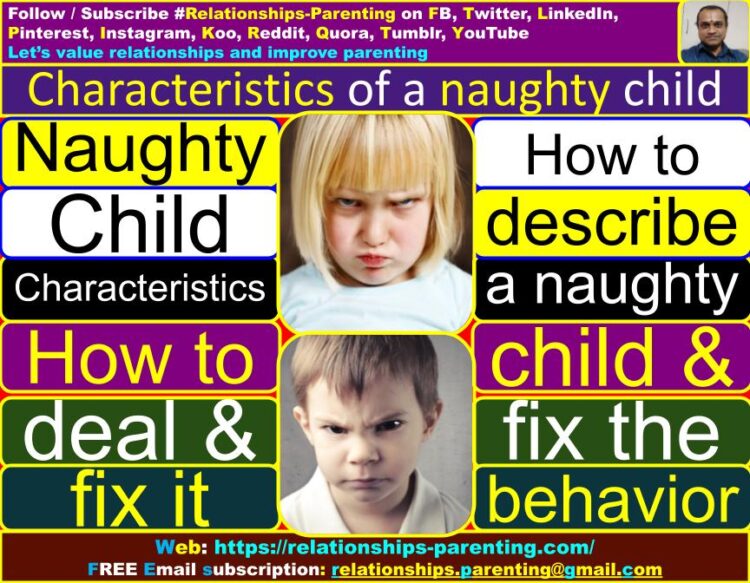
The common questions asked or discussed regarding this subject is as given below:
Characteristics of a naughty child | How to handle naughty child at home (in class) | How to handle a naughty toddler | How to handle a naughty child in kindergarten |
How to deal with a naughty child at school as a teacher | How to handle child with behavior problems | Why is my child so angry and naughty | What causes a child to be naughty? | How do I stop naughty behavior? |
How do you discipline a child that doesn’t care? | What to do with a child who misbehaves? | how to deal with a naughty child | How do you discipline a child that won’t listen? |
What causes a child to be naughty? | How do you deal with a child that misbehaves? | How do you control naughty students? | And many more…
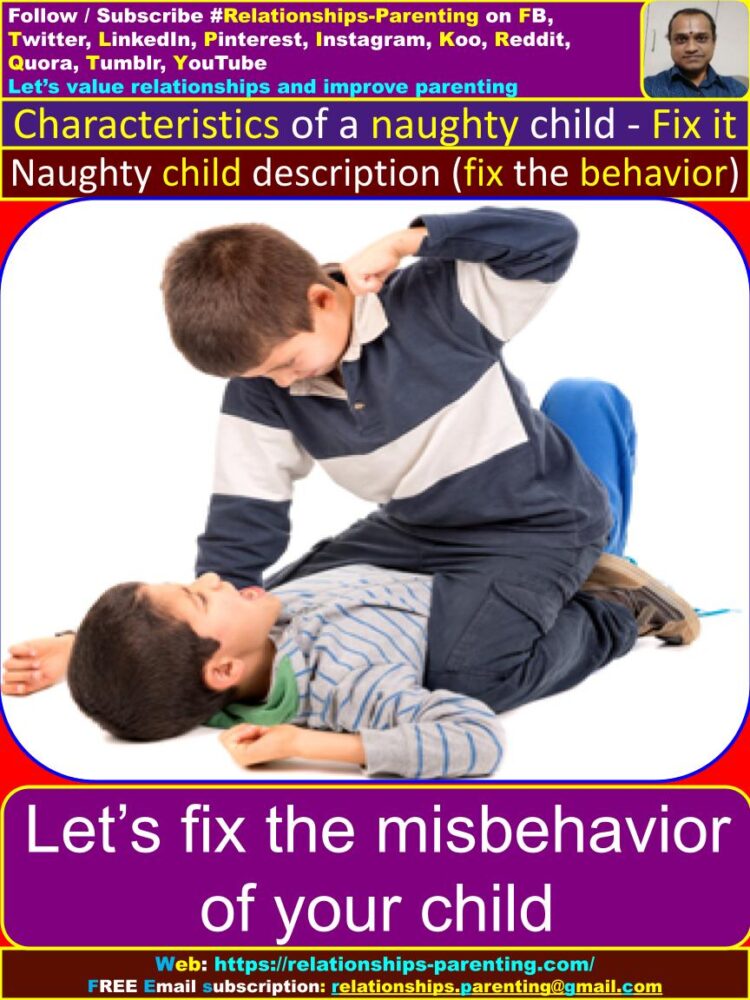
The word ‘naughty‘ always doesn’t mean a child is behaving in the rude, impolite, immoral, disrespectful, abusive, derogatory manner.
Meaning of a naughty child : “Some time, a child is called a ‘naughty child’ when he / she is demonstrating and indicating one or more behavior that adults find: unexpected, impatience, irksome, displeasing, mild or harsh actions which causes chaotic and embarrassing situation (to parents).
There may be one or multiple reasons for this troublesome conduct in kids, toddlers and young children.
Generally it may be because they are highly immature, exhausted, hungry for food and other things, hyperexcited about something, irritated due to unmet expectations, sometimes too happy and few-times too bored.
This behavior causes parents to control such children too difficult, burdensome, mysterious, painful and highly puzzling too in one or many circumstances. Many times, parents do not understand and completely are unaware about the reasons for their child’s unacceptable behavior.

Few times, such parents feel so irritated that they even take actions such as scolding the child and even thrashing the kid for such erratic behavior in-front of others too.
This has to be completely avoided, especially when that child and parents are surrounded by known and / or unknown people.
But, a little pre-instructions, directions and negotiations by parents to child can repudiate this eccentric, quaint, unusual and bizarre behavior by the child.
Raising a child, especially a hyperactive kid would be highly onerous, Herculean, strenuous, uphill, arduous, exhausting and grilling task, but at the same time very exciting and dutiful assignment.
There are different types of naughty children like: Few of them are always disobedient, while others sometimes listen to their parents occasionally and few don’t.
Dear parents and guardians, always remember that, you need to understand a naughty child’s behavior and mindset and try to change their conduct and not to punish them. A naughty kid would be expecting one or more unfulfilled need(s) and his / her conduct may be an effort to get that unfulfilled need met.

If you are caring for children who are not your own biological children, you can take steps to teach them to conduct without undermining his / her parental sovereignty. You can assist a naughty child by providing a safe space to say what he / she need.
Move forward to set limits, deal with paroxysm, analyze the misconduct, and reinforce proper conduct with the child, and you’ll definitely be raising well-mannered children shortly.
List of characteristics of a naughty child (toddler) (kid) and how to deal and fix it is as given below:
How do you describe a naughty child and fix the behavior steps is as given below:
Provide moderate amount of freedom : Yes, providing a small amount of independence to your naughty child will make his/her mind free. A naughty child most of the times will turn a blind eye about your instructions and directions.
Sometimes, this behavior in-turn might make you feel irritated and annoying. But always remember that, your sweet heart is blossoming (growing) and this could be his / her way of showing the freedom.
Don’t you want to constantly raise a child who is a self-dependent and self-reliant and don’t you want he take the calculated decisions?
The ability to really think independently, question ideals and bring about change is found only in leaders. While a decent and well-behaved child don’t always have positive outcomes and beneficial end results all the time.
But, you should also keep in mind that, the freedom should be nominal and as per the situation and must never exceed the limits.
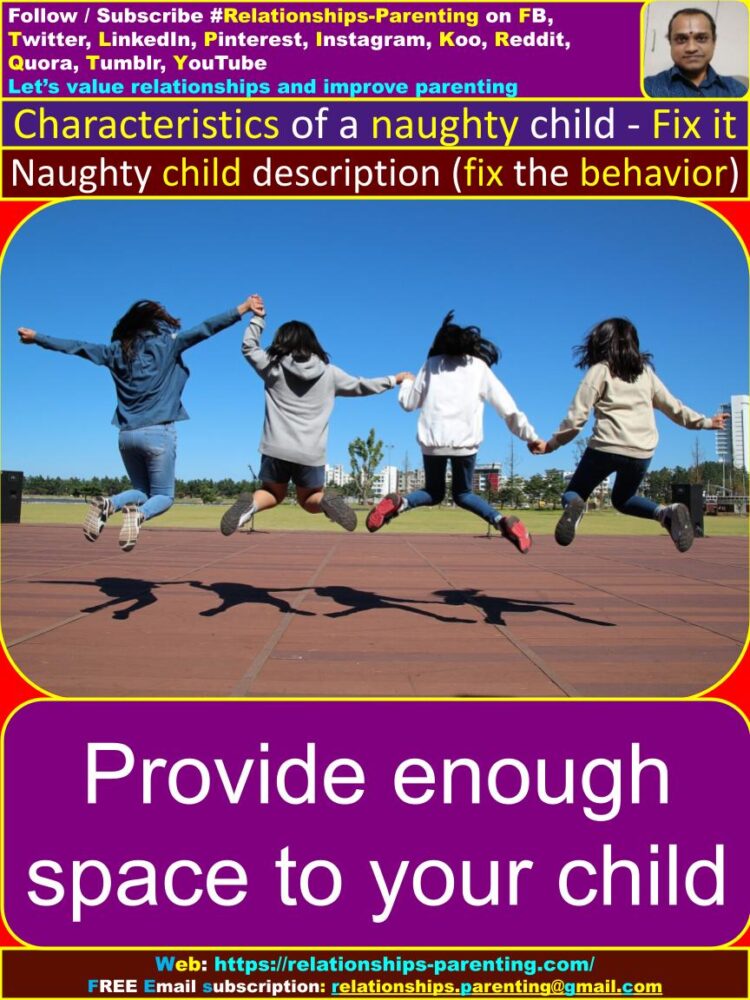
Create a set of rules : This set of rules must be drafted with respect to your child’s age and conduct. This is because, younger children will be needing simple and elementary rules, while little grownup children will be requiring more systematic rules
All the rules must be adaptable, adjustable and flexible rules as per the age and situation. The checklist must should give importance to the naughty behaviors about your children and should never harm / her confidence in anyway.
Examples are : For younger kids, the checklist must contain things like – waking up time, making the bed, brushing the teeth, eating properly and fully, safeguarding their toys, etc.
For little older kids rules will vary like: Wake up in time, take bath independently and properly, eat the breakfast in time and fully, completing the homework on regular basis, play adequately, use the electronic devices limitedly and finally sleep in time (between 9:00 to 10:00 p.m.).
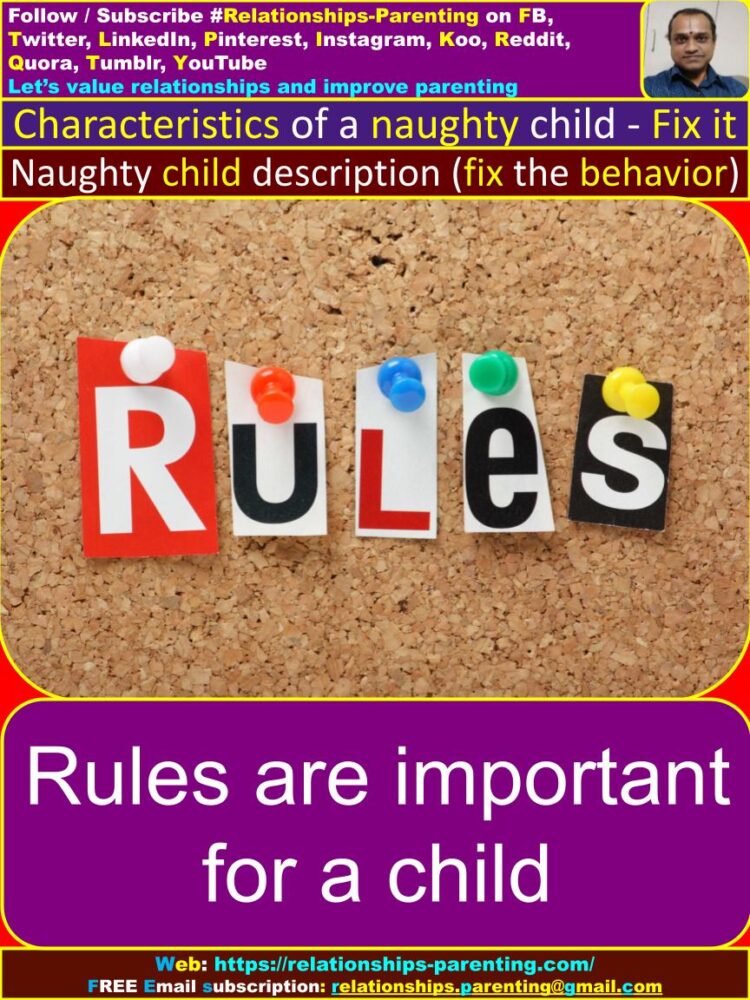
Do what feels appropriate : You have to do what is right for your child, you and your whole family. If you do things which you don’t believe in or feel is right, it probably won’t work for your child too.
Children are very clever and will always be watching your mental and physical behavior all the time, and they will act as per your intellectual and attitudinal conduct. Thus, be very careful while you are behaving, it may be mental actions and physical reactions.

Children have robust amount of energy : Some children prefer to be busy with chores around the house or go out to play rather than sit quietly. Children have a tremendous amount of energy levels and many times they may not always act in ways that are acceptable to you.
Nevertheless, you should always remember that children love to explore and interact with the world around them in a way that might seem mischievous to adults.
By welcoming this and giving your child the freedom to continue with his ‘naughty’ activities, you should consciously take a positive risk in supporting his / her behavior.

Attach instant outcomes to each rule : You don’t just need to have a clear set of rules that your child can understand and follow. But at the same time, you should also be clear about what will happen when one of the rules is broken by your child.
If a high priority rule is broken, for example your child hits someone or breaks something intentionally, the outcome should be more severe than if the child breaks a less high priority rule, for example not making the bed in the morning.
Always remember that, never hit or spank your child like an ordinary, unreasonable and indiscreet parent.
Thrashing, not only damages your relationship with your child, but at the same time, it shows your child that he / she can get what they want by breaking things and hitting weak people.

Always ensure to discuss even the smallest rule together, along with the outcomes if your child break one or rules. That way, your child understand what to expect and what not to expect from you and others.
For older children, you can also discuss the outcomes of breaking the rule(s) together and ask for their opinion on what some appropriate consequences might be.
Continue to do the good work : Once you decide to do something, keep doing it. Sometimes, solutions take time to work. Get support from your spouse, a good friend, some other virtuous parents. It’s good to have someone to talk to about what you’re going through.
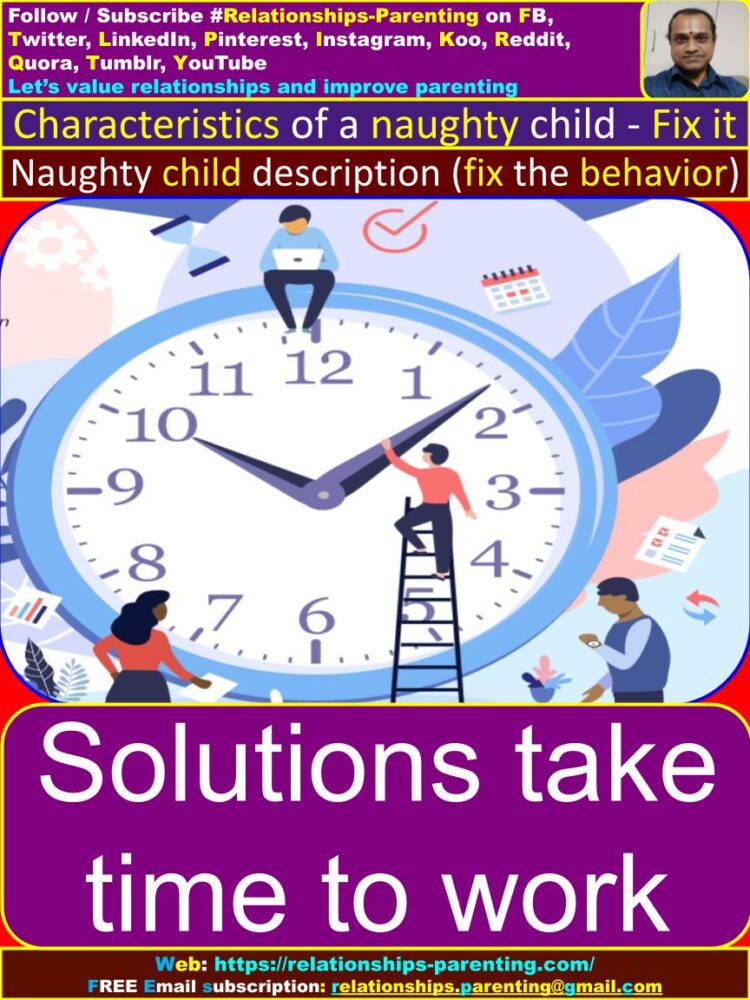
Todays children are both curious and creative : We have great expectations from our children. We expect our children to become great scientists, engineers, doctors, artists, sportsmen, astronauts etc.
Most naughty children are highly curious and creative, and also intelligent too. However, sometimes it is these kids who get their hands dirty. But, do you think your child can easily become an artist or a scientist or a sportsman without making a mess in life?
Thus, before you raise your thanks or scold your child for digging the backyard or soiling the carpet or scraping his knee, do remember that it is your child’s inquisitive and creative mind that makes him all that.

Provide them things to do : Kids who are bored will find ways to entertain themselves easily without much outside help and support. While it isn’t necessarily a bad thing for kids to use their own creativity and imaginations when it comes to entertainment.
It can also lead them to act and behave in ways they know they shouldn’t. For example, if your child will be home most of the day, try scheduling different activities for him / her on regular basis.
Let your child get involved in coloring using the coloring book and crayons for an hour and you may do what you need to do. Spend some time playing with your child together, ask him / her to help you make lunch, or do some finger painting together outside.
It’s good to provide your child some time to play on their own, but it’s also equally important to spend time playing together and nurturing your relationship with them.

Be consistent and cautious : Children need consistency and also need your support with cautiousness. If you react to your child’s behavior in one way on some particular day and a different way the next time, it is confusing for your child and here you need to be extremely cautious.
It’s also highly important that everyone close to your child (other family members) treats their behavior in the same way the way you do. This looks an Herculean task, but as a parent, you need to give your best regarding this.

Today’s children are expressive in nature : Gone are those days when children were informed to conceal their emotions and always put on a happy face. Emotional bonding is a highly necessary and desired quality in today’s world.
Accepting and revealing your feelings is considered healthy in today’s world. Making different faces or being mean doesn’t always show your child is crossing his / her limits.
It could also mean that he / she is upset and is venting his feelings to you. Thus, speak to your child and understand what is worrying him / her and what are the solutions for his / her bothering’s.
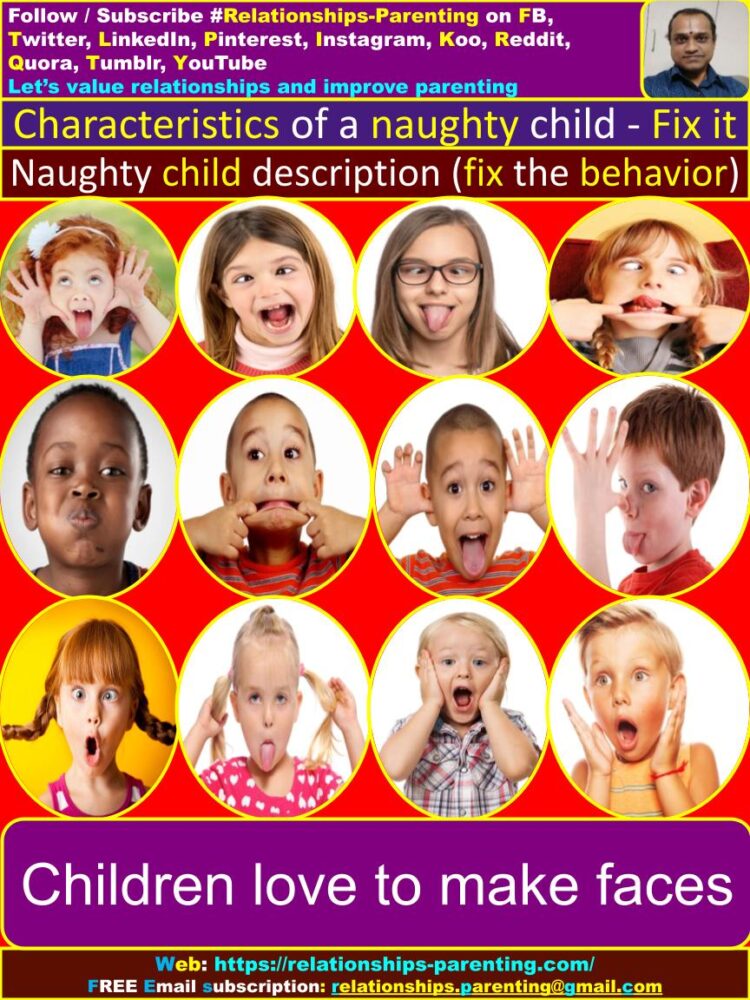
Make a timesheet : Apart from giving your child ample amount of assignments, you must have a timetable that you follow every day, especially if your child is not of school age yet.
This will help children understand what to expect and what not, and will also reduce the chances of dullness and restlessness in your child. For example, ask your child to go to bed at the same time every day. If they are of school age, wake them up at the same time every day, even on weekends.
If you are unable to do something that is on the timesheet, be sure to provide a substitute time for the activity and follow through on your promise to help build trust with your child.
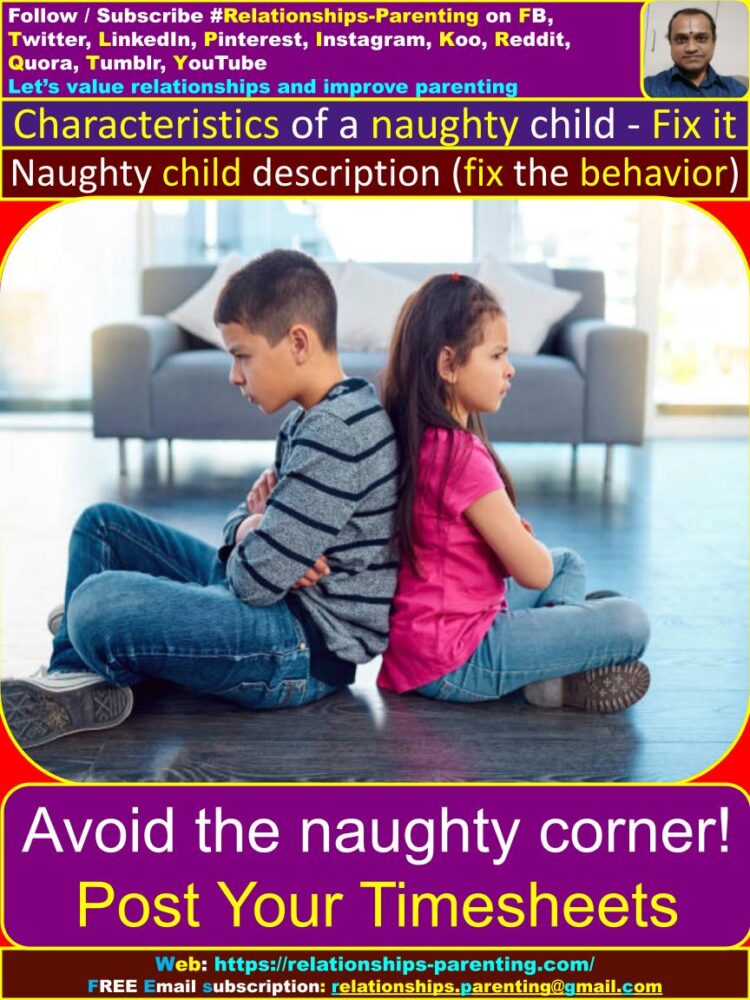
Avoid overreacting : It couldn’t have been an easy task. When your child repeatedly does something annoying, your anger and frustration can build up. Sometimes it’s impossible not to show your frustration, but try to stay calm as much as possible.
Move ahead on to new tasks you can both enjoy and feel good about as soon as possible. Find other ways to deal with your irritation, such as talking to other virtuous parents.

Today’s child is bold and fearless : It takes a lot of firmness and skills to withstand pressure to not toe the line and stand your ground. Your mischievous child is strong-willed, confident, self-reliant, unfazed, unperturbed and self-assertive.
While this may not make him / her a popular figure, you can be sure that he / she will pursue his / her goals with great confidence and determination.

Child’s age in very important : Off course, as the child gets older, you always need to rethink the possible rules and the consequences attached to them.
Therefore, it is very important to remember that younger children will not be able to process complex rules with contingencies. While older children can be given a little more control and freedom, but at the same time you need to control their unruly behavior.

Speak to your child regularly : Kids don’t need to be able to talk to be understood. It might help if they understand why you want them to do something. For example, explain to them very clearly why they want to hold your hand when crossing a busy street.
Once your child can speak, motivate them to describe why they are annoyed and upset. This will help them feel less irritated.
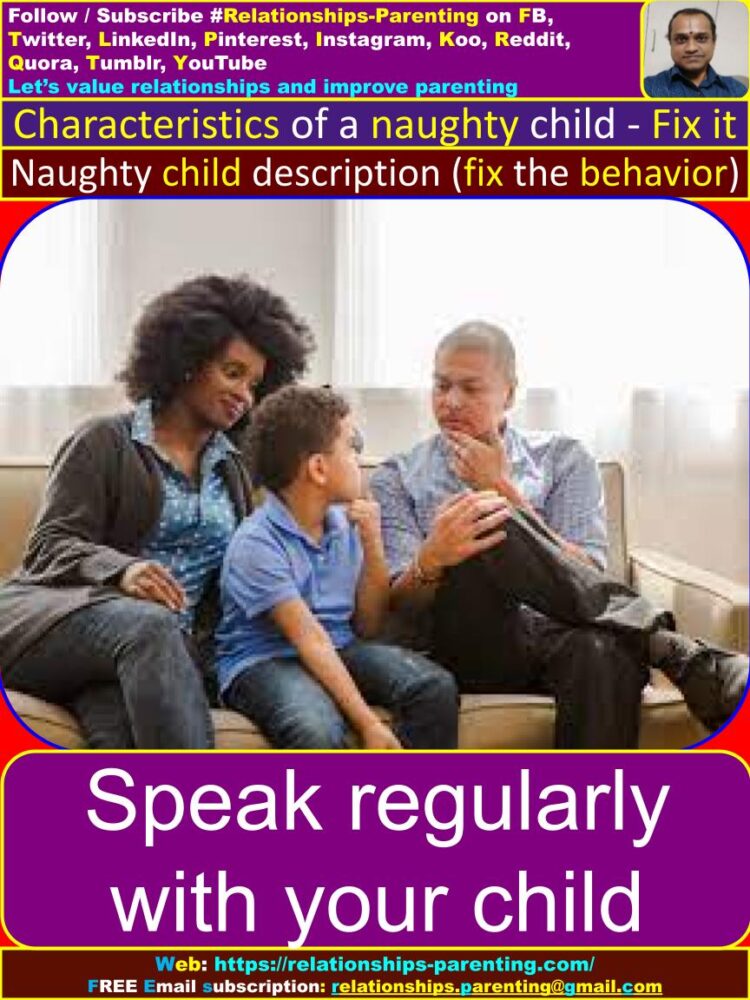
Be witty and quirky : Who does not like to laugh openly. Funny comments and entertaining answers to questions show that your child has the ability to spread laughter and joy.
But, always remember, as your child grows up, his playfulness will reduce, and you will soon miss all those things soon. So, enjoy the moment and cherish the unique personality of your child.

Step away from the impolite behavior : If your child is having a major tantrum, e.g. Yelling, screaming, crying, fist-bumping, etc., the best thing you can do is alienate the audience they are performing for.
This can be just you, but it can also be other family members, children, your child’s friends, grandparents, relatives, neighbors, etc. If you’re at home, and your child isn’t at risk of hurting themselves, suggest that everyone do something else in a separate room for time-been.
If you are not at home, separate your child from the public place as soon as possible. For example, if you’re at the grocery store, take the child with you.
Make sure to prioritize correcting mischief over the task you are doing. For example, if you are at the grocery shop with your child and he / she misbehave, you may need to stop at for a moment and address your child’s behavior.
Consider what strategies you might use in these types of situations, and make sure you’re prepared for all of these things.
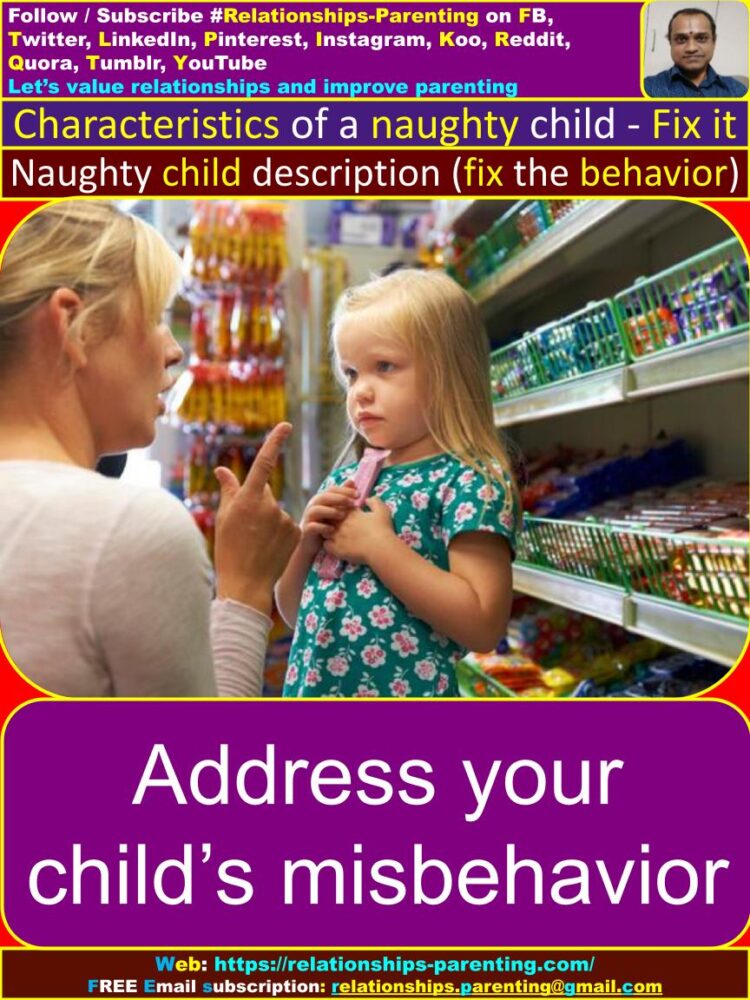
Stay positive about the favorable things : While your child’s behavior is good enough on some occasions, the good they do may be overlooked.
Appreciate your child when you are happy with something he does. You can tell your child when you are happy by giving them attention, a hug, or a smile.
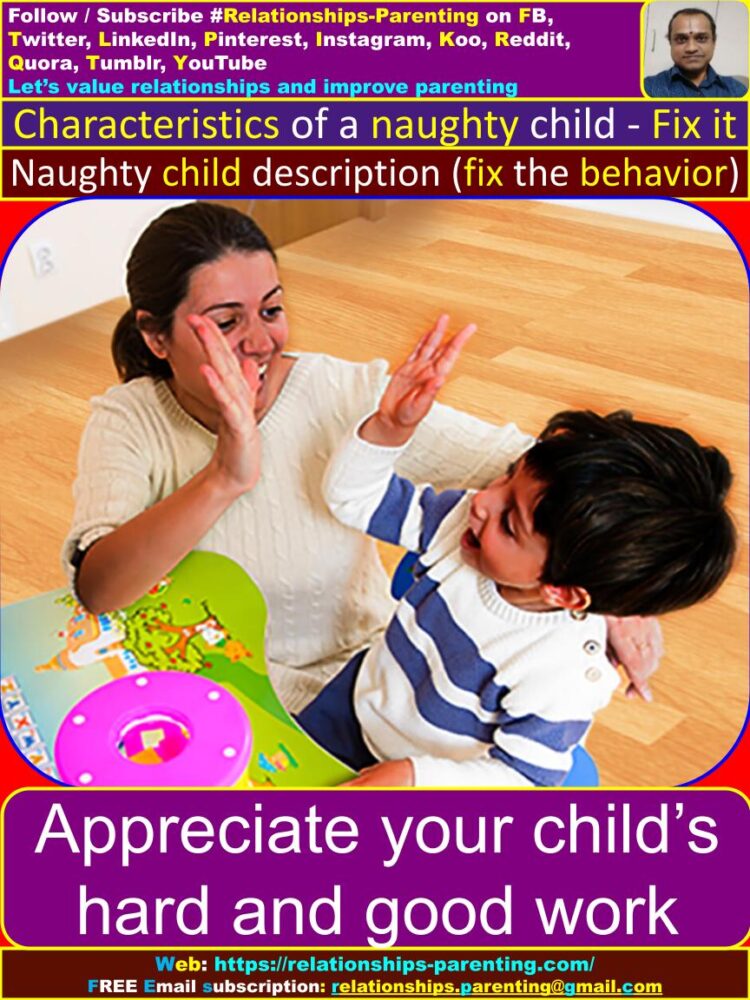
Try to understand the limits : Does your child act naughty only when you are around and is well behaved with your spouse? As upsetting as this is for you, it is also a sign that your child is beginning to understand limits with each parent.
This very clearly shows that his relationship with both his parents is becoming more clearly defined. Try to narrow down this type of conduct. He / she should always behave in the same manner with both of you.
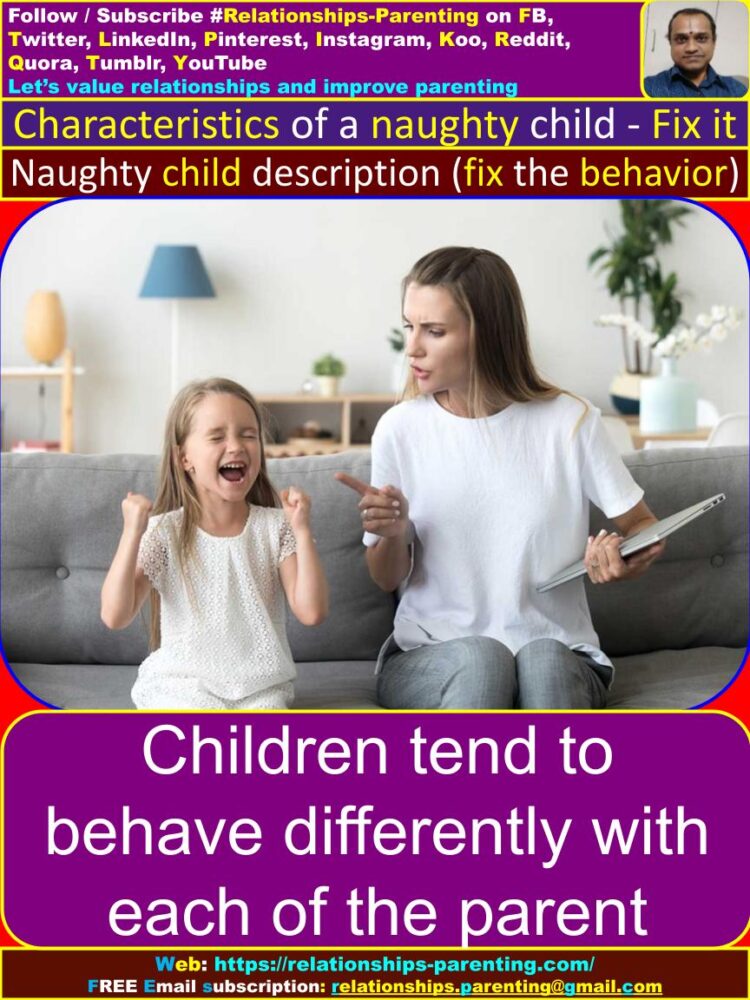
Let your child know you understand that they’re upset : If your child is very young, you can let him / her have his / her tantrum alone in a secured place.
Check with your child regularly, and let him / her know that you know he / she is upset, and that you can talk to him / her about why he / she is upset when they’ve had a tantrum.
If a young child reacts violently by hitting, kicking, scratching, or biting you, keep them on time. Tell them that such behavior will not at all be permitted.
After the child calms down, listen to what they have to say. Let them know that throwing a tantrum is not the best way to deal with their problem. However, do not fix at this point and figure out the best way to handle it and move on.
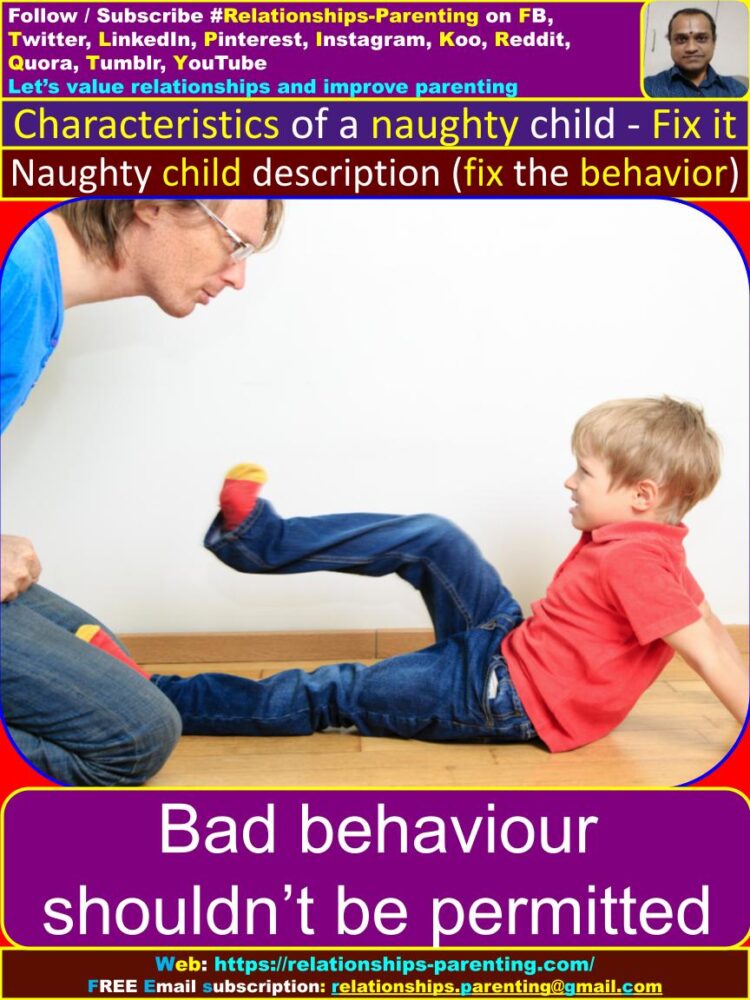
Give prizes and gifts : You can help your child by rewarding them for good conduct. For example, appreciate them and provide them their favorite food at snack time.
If your child behaves well, tell him / her how happy you are. Be specific. Say, “My son / daughter, it’s good for putting your toys in the box when I ask you to.” Always remember, don’t reward your child before they do a good work. That will be a bribe, not at all a reward.

Remind your child that you love them most : Tell your child that even if you don’t like their misbehavior, you love them most and you will always do forever. It is highly important for your child to understand that your love is not dependent on their good behavior.
For example: You might say, “That anger was so bad. Although I don’t like it when you yell and scream like that.” “Even if you throw tantrums, I love you so much, I hope you can understand this.”
Don’t say things like this at all: “You used to be such a bad kid. Sometimes, it’s hard to love you when you act like that.”
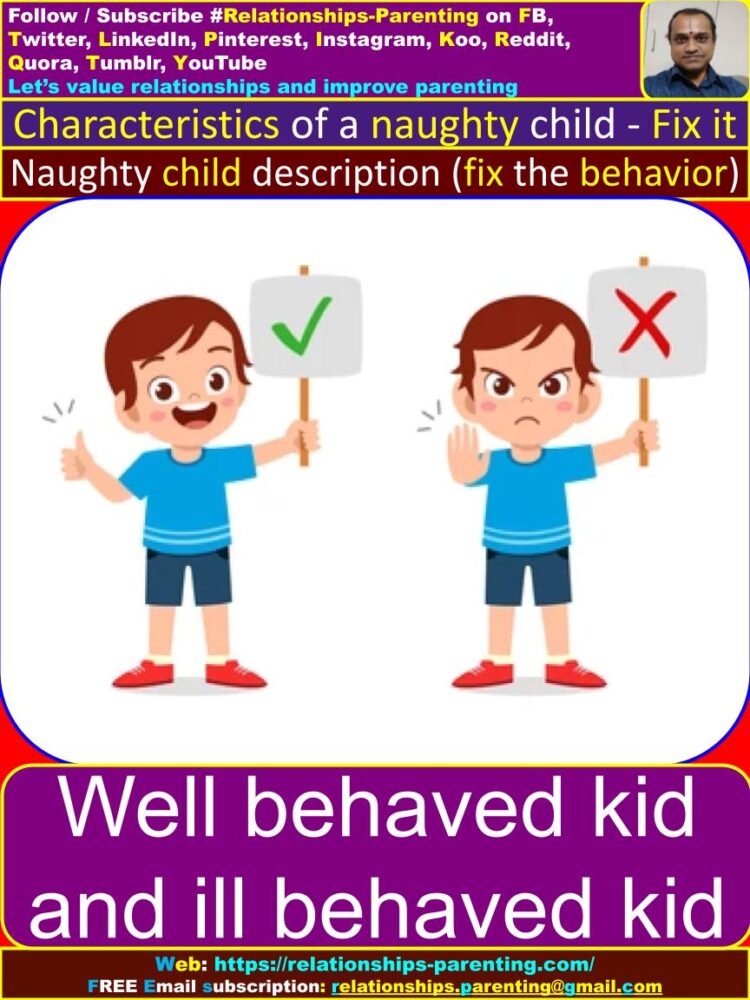
More information will be added to this on regular basis. Please visit this post and blog / website to know more about relationship and parenting.
Continue reading about:
To know more about “Husband and wife information, facts“, please click the below link:
Husband and wife information, facts
Dear friends, if you need any clarifications about this post, kindly let me know, I will definitely try to answer all of them.
Also add your COMMENT below, SHARE on different SOCIAL MEDIA networks.
This will help to know the quality of this content and also it will be helpful to know if any improvements is required for the content.
If you feel this content is useful to you and has helped you to improve your knowledge, kindly share this with your well-wishers.
Because “SHARING MEANS CARING”.
To receive FREE EMAIL SUBSCRIPTION about #Relationship #Parenting, you can send an email to [email protected] from your email ID.
Let you and your well-wishers live a prosperous, healthy and fearless life through out your life term.